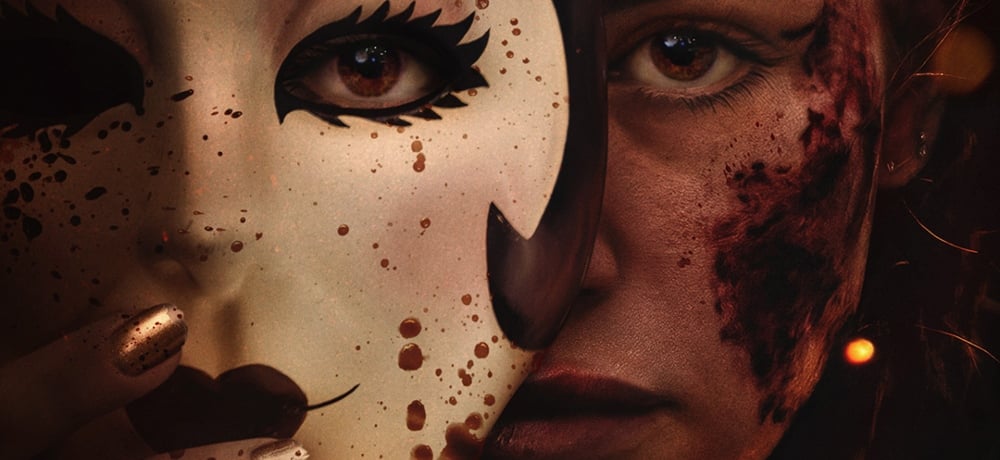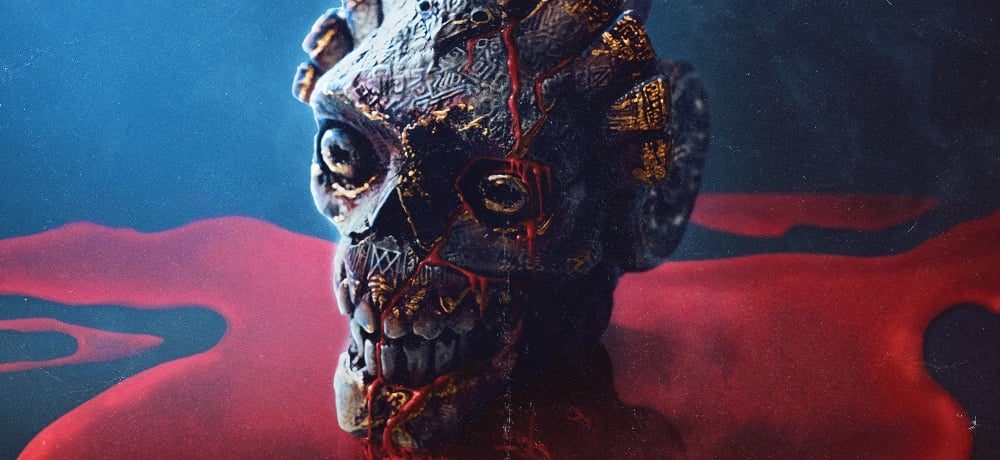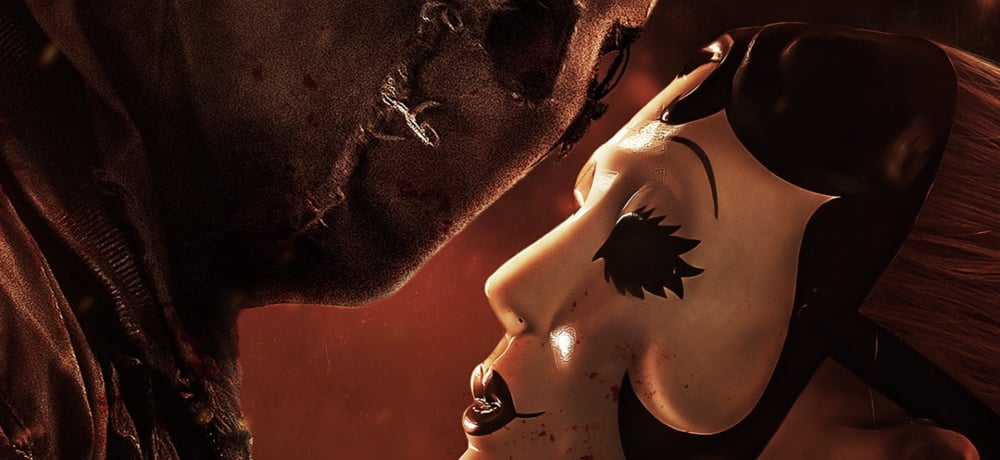





Sleep paralysis leads to eerie encounters with a supernatural entity played by Javier Botet (read Heather Wixson's interview with the renowned actor here) in Mara, and with the new horror thriller out now in theaters and on VOD platforms from Saban Films, we caught up with composer James Edward Barker in our latest Q&A feature to discuss his early love of music, his greatest horror influences, and collaborating with the creative team of Mara to craft a compelling and haunting score.
Thanks for taking the time to answer some questions for us, James! When did you initially become interested in music and what did you listen to in your formative years?
James Edward Barker: Hi, thank you for the interview, it’s exciting to be talking to you, I’m a big fan of Daily Dead!
It’s a mixed bunch for sure—everything from jazz, blues, hard rock, trance, house, rap, and the list goes on and on. Although, I’ll never forget the first-ever piece of music I bought, it was a 7” vinyl of Snooker Loopy by Chas & Dave! I don't know what drew me to it or why I bought it, but the sheer pleasure of taking it home, taking it out of its cover, and playing it on my sister’s stereo at the age of six was amazing. From then on I was hooked, and shortly after that I was very lucky to have been given the opportunity to buy three cassettes, and I chose Licensed To Ill by the Beastie Boys, Laughing At the Pieces by Doctor & The Medics, and Please by the Pet Shop Boys. Although all so different, I think what drew me to the music was the sense of being free and they all came with an anarchic streak. The records are all still a big part of me and Beastie Boys are still one of my favorite bands of all time—definitely in my top five.
When did the idea of becoming a composer on film projects first appeal to you, and how did you get into the industry?
James Edward Barker: I’d always loved film scores and composers, but I was always equally as distracted by the anarchy and the seemingly chaotic lives that surround bands… especially Guns N’ Roses, Nirvana, Pearl Jam, Beasties, etc., and I wanted to be playing my guitar in those surroundings. Besides, I always thought you had to be like 50 years old to be a film composer!
After a few close calls, unfortunately, I never quite got the break I was after in my bands, and around that time I’d also met my wife and it was after a few years that I decided I really needed to be earning something! So, myself and an old buddy of mine, Tim Despic, started toying around with demos for commercials, and we got lucky a few times, but we got our composing break from a producer named Neil Peplow on a romantic comedy called Unhitched!
You’ve composed the music for several horror films and thrillers in your career. What is it about creating music for those genres in particular that appeals to you?
James Edward Barker: Yes, I seem to gravitate towards films that allow me the freedom and scope to do things that are a little bit different, a bit more arthouse or left field in parts, and hopefully that are emotionally driven, but maybe with a darker edge. A lot of the time I’m not a fan of the structure of the music being too obvious. I think of music as a painting, and I don’t think we need to be restricted to melodies so much. I like the idea that it can be sounds that subconsciously link our minds to characters and moods in the film. Horror definitely allows you to do that… oh, and Andrew Haigh dramas!
Growing up, did you enjoy watching horror movies? Were there any horror film soundtracks that have stuck with you and inspired you over the years?
James Edward Barker: I still love watching horror movies—they were my first true love. Me and my mate, Ed, were obsessed with them and we were very lucky in that we had a really lazy guy in our video shop, and back then you had the cassettes in their actual cases, so you could switch Bambi for RoboCop… or IT!
We watched them all. I remember we went through a creature feature phase: An American Werewolf In London, The Fly, The Thing… and then the little guys: Gremlins, Ghoulies, Critters! We were big Stephen King fans: Pet Sematary, Children Of The Corn, Salem’s Lot, Cujo, and of course, The Shining, which is still one of my favorites. One of my earliest memories was watching The Twilight Zone, and the creature on the wing of the plane… wow, that was incredible. I loved fantasy as well. Labyrinth is still one of my favorite films and I’m determined to buy an Old English Sheepdog and call it Ambrosius. Presently, my wife forbids it, but one day I’ll surprise her.
The supernatural scares me the most, though. Poltergeist was full on… I watched all of them. A Nightmare On Elm Street scared me a lot… as did IT! I had to kill Pennywise in a dream of mine once because he was giving me so many nightmares. I actually put a box of matches under my pillow at night when I was about ten years old, and I lit him on fire in my dream! Once I killed him, I never had another Pennywise dream. And then The Woman in Black (1989) came out.
Soundtrack-wise, I guess from back then, the weird one would be Beetlejuice. The big ones would be themes like RoboCop and The Shining. On a smaller scale, I loved Rachel Portman’s score for The Woman in Black (1989).More contemporary horror scores that I love are Hereditary, Annihilation, Insidious and The Conjuring scores… Upgrade. One of my favorite of all time is the Exorcism Of Emily Rose. I love the vocal elements from it, and the Mara score probably drew a lot of inspiration from that score.
What types of instruments did you use to score the new horror movie Mara?
James Edward Barker: One of my favorite elements about the Mara score is the use of vocals. A dear friend of mine, a music concert artist named Robin Warren, and I spent a long time recording various female vocalists in different locations. We recorded in two locations. Firstly, I recorded an old friend of mine, Claire, and myself singing some falsettos in a church in Kent for the dramatic emotional pieces (like on track three, "The First Case", or track five, "Committed"); and then Robin and I recorded some female vocals in a flooded and abandoned bunker in Belgrade (random—you can even hear the water still dripping if you listen closely), and Robin used some of his old tape machines for us to loop them through and we created these incredible delays and scary tape effects. I used these to open the film with (in track one, "Bang!", and you can hear them throughout the score).
I also used everything from pianos, impaired strings, some big percussion, and I also used some really strange things. For instance, one of my oldest and closest friends, Del, stole a “welcome” doorbell from a friend of his from back in his uni days, and it’s basically a three-stringed hammered dulcimer inside—it’s really out of tune and it sounds very scary when you set it off and it plays by itself. For the sound of Mara, I used a handmade cheap Thai-Saw Duang, and I used an old bow (no resin) and pulled it very slowly across the couple of the strings whilst pulling on the bow strings. It kind of sounded like the devil being sick. Check out the end of the "Opening Titles"!
What is the most challenging or rewarding experience you had while working on the score for Mara?
James Edward Barker: Challenging: the fact that I pulled together a lot of favors from people I love and respect, and knowing it’s probably going to be the last score I can do that on (because I've done it many times now).
Rewarding: What has been very rewarding is that I believe I made a small budget film sound like a horror film that can stand up against the big budget studio horror films. This is something I’m extremely proud of.
Did you have a lot of creative freedom while creating the music for Mara? Did you collaborate a lot with the director, Clive Tonge?
James Edward Barker: Yes and yes. Clive, the writer and Scott and I had been trying for seven years to get this movie made. So I knew this movie inside out already, and I suffer from sleep paralysis on a weekly, sometimes daily, basis, so it was kind of like scoring my own nightmares, which is pretty weird! But right from the beginning, Clive and I were discussing sounds and music—the grey areas between them, the vocals, and the weirder instruments. Clive was very patient with me and once I started writing, he waited for me to deliver my first whole pass before he gave any notes. Then we went through it as a duo.
Clive is a big team player, he always wants a team effort, so Jonathan (the writer), Scott Mann (producer), Clive, and I would all throw ideas back and forth. It was very organic and it all seemed to work. Very little of what I handed in from the first pass didn't make it to the final cut, but that’s not to say that cues had to be reshaped or edited because Clive would have specific ideas about certain scenes. The whole music process was a great experience.
What projects do you have on deck that you can tease, and where can our readers keep up with your work online?
James Edward Barker: I’m literally about to get on the plane to go to the Toronto International Film Festival to see the world premiere of my Gothic drama, Gwen, which plays this Friday, September 7th. It has a very foreboding nature to it. My score for that is much more pared down and sound-based, a bit like the Andrew Haigh drama I did, Lean On Pete.
Final Score is also out this Friday in the UK and then the 14th of September in the US. It’s a big action score, which I composed with Tim Despic (whom I got my first break with), starring Dave Bautista and Pierce Brosnan.